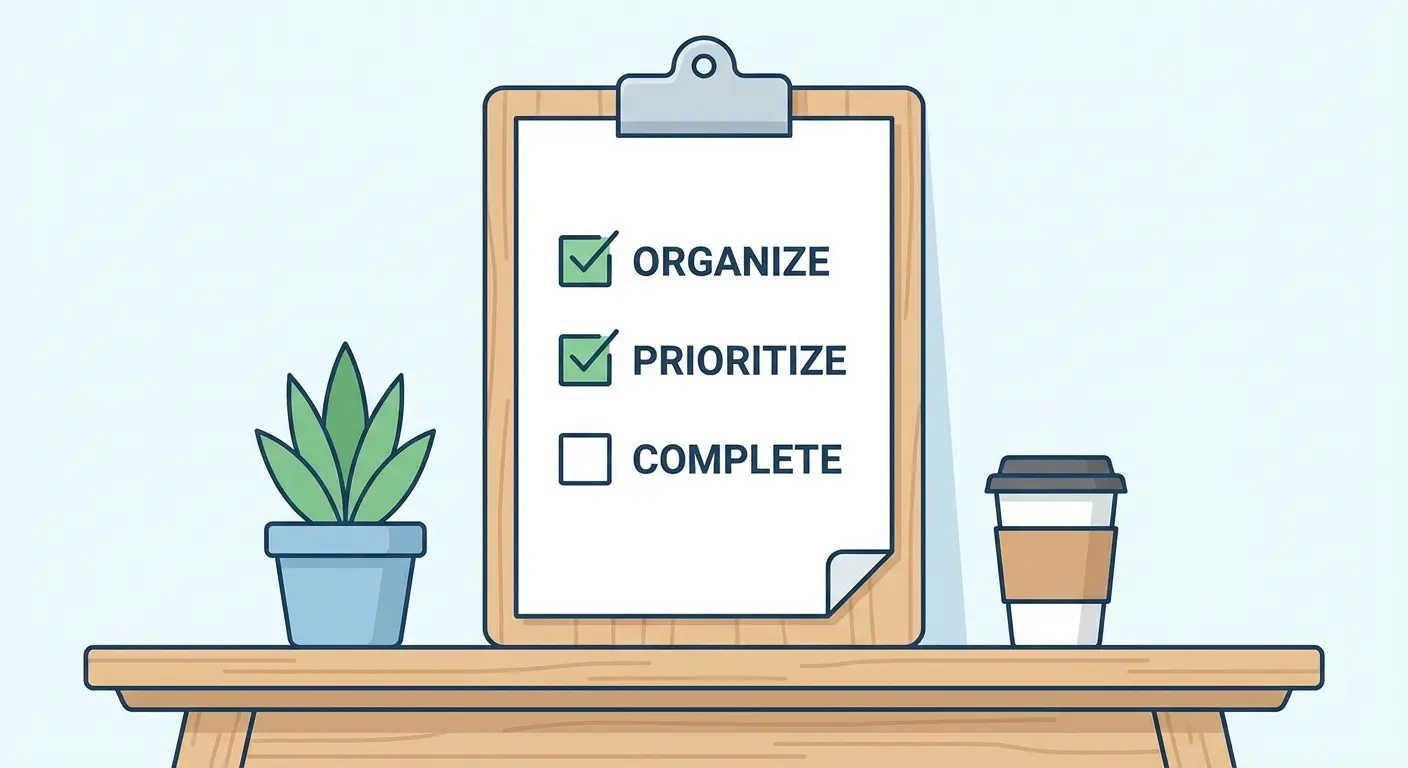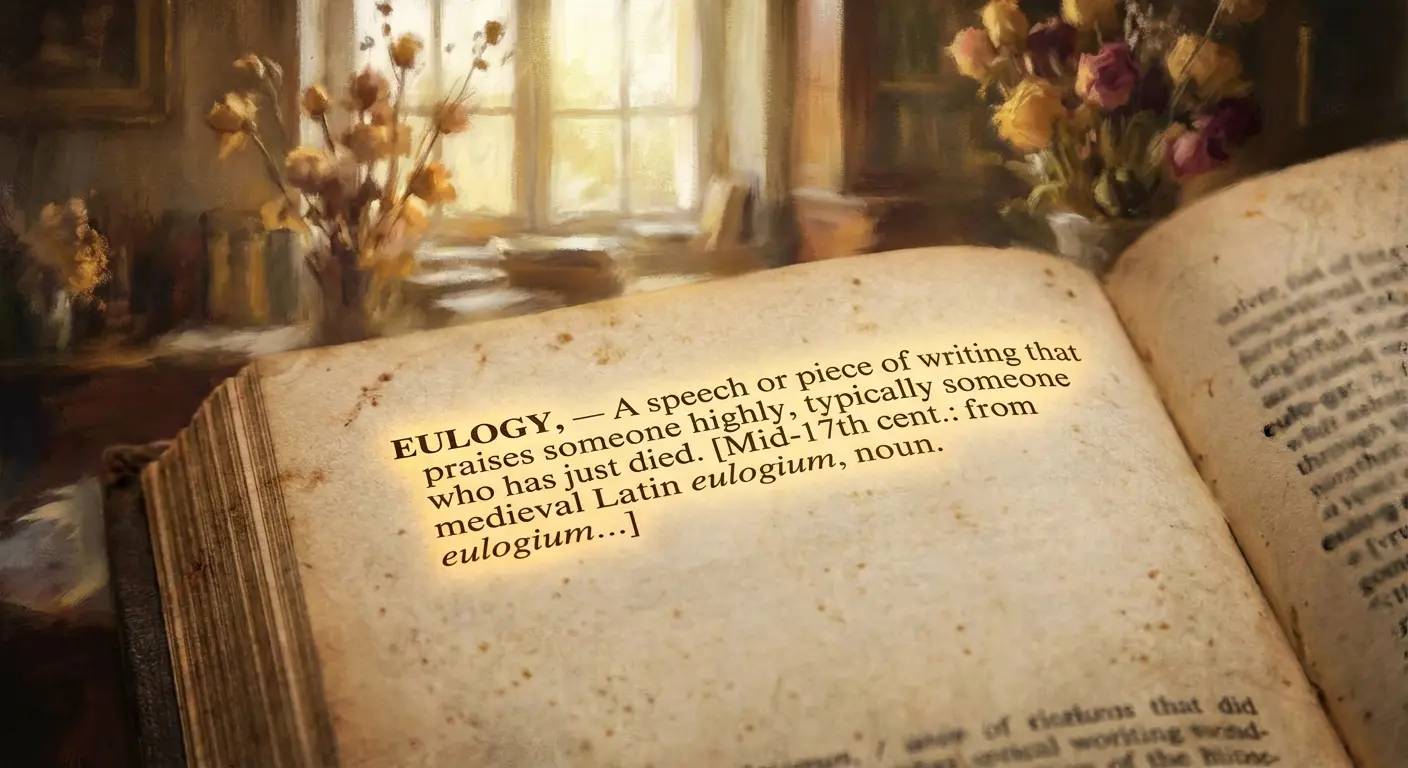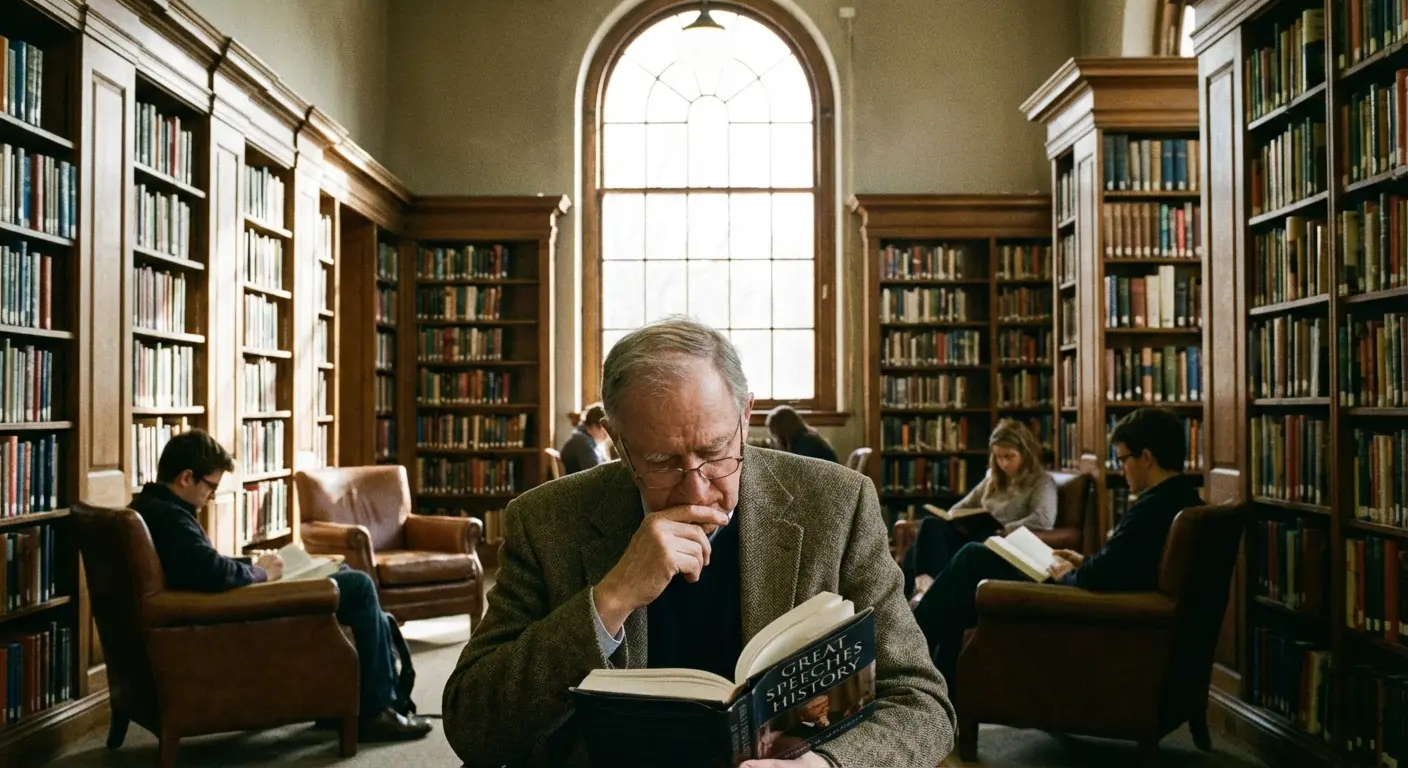If you are reading this, you have likely been asked to do something incredibly difficult. Writing a eulogy is one of the greatest honors you can pay a loved one, but let’s be real: it is also terrifying. You are trying to sum up an entire human existence in a few minutes, all while navigating your own grief. This guide is here to help you take a breath, organize your thoughts, and get words on the page. We will cover how to handle the “blank page” panic, how to capture a personality without listing a resume, and how to actually get through the speech on the big day.
If organizing your thoughts feels impossible right now, the Eulogy Generator helps you get started gently.
Quick Resource:
Eulogy Generator – A guided tool that helps you turn memories into a heartfelt, well-structured eulogy when the words feel overwhelming.
It might feel like a heavy lift, but you don’t have to write a biography. In fact, most great eulogies are only about 3-5 minutes long. You just need to fill those minutes with truth, love, and maybe a little bit of humor. We’ll show you how.

TL;DR (The Quick Version)
If you are short on time and just need the basics, here is the cheat sheet. We stripped away the fluff to give you the immediate “need-to-knows.”
Writing a eulogy is a balancing act between emotion and structure. Here is what actually matters:
- Capture the vibe, not the dates. A tribute is about their spirit, not a list of when they graduated or got married.
- Know the room. A toast at a pub requires a totally different tone than a speech at a cathedral.
- Don’t start with a blank page. Look through old texts and photos first to jog your memory.
- Find a “North Star.” Pick one theme (e.g., “She was a rebel” or “He was a quiet protector”) and hang your stories on that hook.
- Show, don’t tell. Instead of saying “he was generous,” tell the story about how he gave his lunch to a stranger.
- Keep it short. Aim for 3 to 7 minutes (roughly 500 to 1,000 words). It sounds short, but it feels long when you’re up there.
- Get help if you need it. There are tools available to help you get started if the grief brain fog is too thick.
When you need more than a cheat sheet, the Eulogy Generator walks you through the process step by step.

What is a Eulogy, Really?
Let’s take the pressure off for a second. Understanding what a eulogy is—and what it isn’t—can help ground you.
It’s Not an Obituary
A lot of people confuse the two. An obituary is a news notice; it’s facts and figures. A eulogy is a gift. It’s a story. You aren’t there to give a history lesson; you are there to share a legacy.
The Meaning Behind the Word
The word comes from the Greek *eulogia*, which translates simply to “praise” or “good speech.” That is your only job here. You are just there to speak good words. Whether you are in a church or a backyard, the goal is the same: capture the essence of who they were, not just what they did for a living.

A Quick Note on Pronunciation
If you’ve never had to say the word out loud, it’s pronounced “YOO-luh-jee.” It seems small, but sometimes knowing the basics helps you feel a little more in control.
Read the Room
Grief looks different for everyone, and ceremonies are changing. The venue usually dictates the vibe. A speech at a funeral home is going to feel very different from a toast at a dive bar.
Here is a quick breakdown of how the tone might shift depending on where you are:
| Feature | Traditional Funeral | Celebration of Life | Living Eulogy |
|---|---|---|---|
| Primary Tone | Somber, respectful, religious | Uplifting, casual, joyful | Gratitude, direct, intimate |
| Venue | Church, synagogue, funeral home | Park, community center, pub, home | Hospital room, hospice, family home |
| Content Focus | Comforting the bereaved, spiritual legacy | Funny anecdotes, shared passions | Expressing love directly to the person |
| Dress Code | Formal (Black/Dark colors) | Casual or Colorful | Comfortable/Casual |
The Traditional Funeral Speech
These are the ones we are used to seeing in movies. They usually follow religious or cultural traditions. The goal here is comfort and respect. If you are speaking in a place of worship, you’ll likely want to keep things a bit more formal and structured.
The Celebration of Life
We are seeing a massive shift toward “Celebrations of Life.” The vibe here flips from mourning a death to appreciating the life lived. You have permission to be funny, lighthearted, and anecdotal. You can tell the story about the time they got lost on a road trip or their terrible cooking.
If you need inspiration for a less formal event, checking out some unique celebration of life ideas can help you plan a moment that actually fits their personality.
Here is the difference in tone:
- Traditional: “John was a dedicated father who worked for 40 years at the plant to provide for his family.”
- Celebration of Life: “We all know John loved two things: his kids and avoiding actual work at the plant. I think he’s finally found a place where the supervisor can’t find him.”
The “Living” Eulogy
This is a growing trend where the tribute is delivered while the person is still with us, often during the final stages of an illness. It’s incredibly powerful because it removes the “I wish I had told them” regret. The focus here is pure gratitude—telling them, to their face, why you love them.

Building the Speech
Structure is your safety net. When you’re emotional, it’s easy to ramble. Having a roadmap keeps you on track. For a deep dive, you can check out our eulogy writing guide, but here is the simplified process.
Step 1: The Pre-Writing Phase
Don’t just sit down and try to write the final draft immediately. You need to gather your materials first.
Mining for Memories
Instead of staring at a blinking cursor, go through your phone. Scroll through your text threads, look at old photos, check their Facebook timeline. Talk to your friends. You are hunting for specific moments. Adjectives like “kind” are boring. Stories that prove they were kind are powerful.
Also, keep in mind that memory is a funny thing. As Ian Brown noted in *The Globe and Mail*, “A eulogist quickly learns that a family is a keen but unreliable source of information.” You might hear three different versions of the same fishing trip story. That’s okay. Those contradictions are usually where the real personality shines through.

Find Your “North Star”
Avoid the “resume trap” (born, school, work, death). Instead, find a theme. Was your person a chaos agent? A quiet listener? A relentless optimist? This theme is your “North Star.” Every story you tell should point back to this idea. It stops the speech from feeling like a random list of events.
Struggling to find that “North Star”? The Eulogy Generator helps uncover the theme that ties everything together.
Step 2: Drafting the Speech
Now we get into the actual writing. Here is how to keep people engaged.
The Hook
Skip the “We are gathered here today” intro. Everyone knows why they are there. Start with a story or a defining quirk. A line like “My father never met a stranger he didn’t try to feed” immediately paints a picture. It breaks the ice and lets people relax.
Need help turning memories into stories? The Eulogy Generator helps you shape them naturally.
Compare these openings:
- Weak: “Hello everyone, thank you for coming. We are here to remember Sarah, who was born in 1954.”
- Strong: “The first time Sarah tried to bake a cake, she set the fire alarm off in three different counties. That was Sarah—loud, chaotic, and incredibly sweet once the smoke cleared.”
Show, Don’t Tell
This is the golden rule of writing. If you say she was adventurous, the audience might nod politely. If you tell the story of how she booked a one-way ticket to Paris with no hotel reservation, the audience feels it.
John Podhoretz gave a great example of this when speaking about his father. Instead of just saying his dad was focused, he described a road trip: “His goal—drive 500 miles a day. Find a motel. Eat at a rib joint… Achievement—those 500 miles, every day—that was the purpose.” That detail tells you everything you need to know about the man.

The Goodbye
Endings are hard. Your goal is to summarize the hole they are leaving in the world. Answer the question: “How is the world different because they lived?” Keep it concise. A trailing, unsure finish kills the emotion.
Step 3: Refinement
Once the draft exists, you need to polish it.
Watch the Clock
Three to seven minutes. That is your window. Anything longer and you risk losing the room. Aim for about 500 to 1,000 words. Read it out loud to time it. If you are stumbling over sentences, rewrite them to be simpler.
If you’re worried about length, look at some short eulogy examples to see how much emotion you can pack into a small space.

Using a Template
There is no shame in using a template. “Grief brain” is real, and it makes organizing your thoughts almost impossible. A eulogy template acts as a skeleton. It ensures you don’t forget the important parts while you’re navigating the emotions. For a balanced flow, you might consider allocating your intro story to roughly 1-2 minutes.
When a template still feels like too much, the Eulogy Generator gives you structure without sounding generic.
A Simple Structure:
- [ ] Introduction: Who are you? (Keep it brief).
- [ ] The Hook: A funny or touching story to start.
- [ ] The Theme: The one trait that defined them.
- [ ] The Evidence: 2-3 stories that prove the theme.
- [ ] The Legacy: What they taught you.
- [ ] The Farewell: A final goodbye.
Getting Help When You’re Stuck
We live in the future, which means you have tools at your disposal that didn’t exist ten years ago. It’s okay to use them.
Look for Inspiration
Sometimes the best way to start is to see what others have done. Read through some funeral speech examples. Don’t copy them, but look at the rhythm. Notice how they balance the sad parts with the funny parts.
| Do This | Try to Avoid This |
|---|---|
| Speak Slowly: Nerves make you speed up. Breathe. | Fidgeting: Try to plant your feet and stand still. |
| Make Eye Contact: Find a friendly face in the crowd. | Over-sharing: Maybe save the really wild party stories for later. |
| Use Humor: It’s okay to laugh. It breaks the tension. | Listing Facts: No one needs a chronological history of their jobs. |
| Practice: Read it aloud before the big day. | Going Over Time: Respect the schedule. |

Using Tech to Help You Write
Generic AI (like ChatGPT) can sometimes sound a bit robotic or cold. It doesn’t know your grandma. However, there are interactive tools designed specifically for this.
The best tools ask you specific prompts about memories and quirks, then weave those answers into a speech. It bridges the gap between a blank page and a finished draft.
The Difference:
- Generic Prompt: “Write a eulogy for my dad.” -> Result: Generic text about a “hero.”
- Interactive Tool: “Tell me a funny habit your dad had.” (You say: “He always whistled while cooking.”) -> Result: “We will all miss the sound of his whistling drifting from the kitchen, a sure sign that Sunday dinner was on its way.”

When Words Fail You
Knowing the theory is one thing; doing it while you are grieving is another. If you are staring at the screen and crying, or just feeling numb, we can help.
You don’t have to face this alone—use the Eulogy Generator to create a tribute that truly honors a life.
Eulogy Generator isn’t just a robot; it was built by Jen Glantz, a professional writer who understands the nuance of storytelling. It works like an interview. We ask you easy questions to pull out the memories you might have forgotten, and then we build the speech for you.
Here is how we help:
- We ask the right questions: We dig for the unique details so it doesn’t sound like a Hallmark card.
- Unlimited Edits: You can tweak it as much as you want until it sounds like you.
- Affordable: It’s a one-time fee of $35 to get a professional-grade speech in minutes.
You don’t have to do this alone.
Final Thoughts
Writing a eulogy is hard, but it’s also a final act of love. Don’t worry about being a perfect orator. No one is expecting a TED Talk. They just want to hear the truth about the person they loved. Take a breath, trust your memories, and speak from the heart. You’ve got this.


